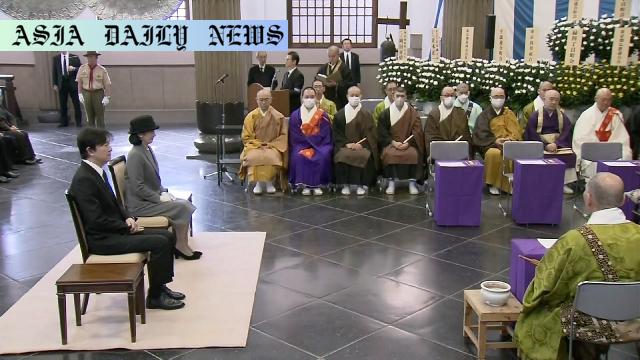Tokyo air raid – People remembered the victims of the 1945 US air raid in a solemn memorial, marking the 80th anniversary.
Tokyo air raid memorial marks the 80th anniversary of the attack.
100,000 lives were lost during the 1945 US attack on Tokyo.
Ceremonies were held with Crown Prince Akishino and public prayers.
Continuous efforts to pass down the lessons of war to future generations.

Remembering the Tokyo Air Raid
March 10, 2025, marked the solemn 80th anniversary of the 1945 Tokyo air raid, an event that continues to resonate deeply in Japan’s national consciousness. This attack, carried out during the final months of World War II by American B-29 bombers, devastated eastern Tokyo, leaving a trail of destruction that claimed approximately 100,000 lives. The scale of loss and suffering during this raid exemplifies the horrors of war and its indiscriminate toll on civilians. In commemoration of this tragedy, Tokyo held a poignant memorial service at the metropolitan memorial hall in Sumida Ward, attended by bereaved families and dignitaries, including Crown Prince Akishino and Princess Akishino.
At the heart of this memorial is a collective effort to honor and remember the victims, whose remains are stored at the metropolitan hall. Many of these remains remain unidentified, symbolizing the anonymity and vastness of loss inflicted by this event. Flowers and prayers adorned the space, with visitors and officials alike sharing a moment of reflection and remembrance. Tokyo Governor Koike Yuriko, alongside 160 attendees, offered incense and prayed for the peace of those who perished.
The Role of Memory in Shaping the Future
Aoyama Yasushi, head of a Tokyo-based group dedicated to preserving the memory of war and natural disasters, emphasized the critical role of preserving historical memory. Addressing the audience, he highlighted the importance of passing the memories of the Tokyo air raid to younger generations. This mission, he argued, serves not only to honor the past but also to leverage its lessons to build a more peaceful and harmonious future. Memorials like this represent more than just acts of remembrance—they provide an opportunity for communities to express collective grief, find closure, and renew commitments to a shared ethos of peace and humanity.
A Legacy of Loss and Reflection
The Tokyo air raid did not just destroy homes and lives; it redefined the character of war’s impact on urban populations. It has become a symbol of wartime suffering, and its lessons are embedded into Japan’s cultural fabric. The 80th-anniversary commemoration provided a crucial platform for dialogue, ensuring that the stories of the victims and survivors are not forgotten. Such events not only honor history but also reinforce the importance of striving for diplomatic solutions over violent conflicts.
As the world accelerates into the 21st century, the anniversary of the Tokyo air raid offers a sobering reminder of the destructive potential of war. It challenges modern generations to learn from the past and to champion peace in increasingly complex geopolitical landscapes. May this remembrance continue to inspire compassion and responsibility in how nations interact and resolve their differences.



Commentary
The Importance of Memorializing Historical Tragedies
The 80th anniversary of the Tokyo air raid provides an opportune moment to reflect on the importance of preserving and honoring historical memory. In many ways, remembering such tragic events serves as a focal point for collective reflection, mourning, and the cultivation of empathy. Memorials remind us of the past, urging us to extract valuable lessons regarding the necessity of peace and the consequences of conflict. The images and stories of affected communities—such as those in Tokyo in 1945—stand as powerful symbols cautioning against the recurrence of war.
Lessons Carried Across Generations
Preserving the stories of those lost in calamities—whether natural or manmade—offers an irreplaceable educational opportunity for future generations. It was poignant to hear Aoyama Yasushi speak about the significance of memory. His words highlighted our collective duty to pass these narratives forward. In a world often drawn to technological progress and global advances, remembering the human cost of history is essential for moral and ethical grounding.
Building a Peaceful Future
What stands out about events like the commemoration of the Tokyo air raid is their ability to foster not just communal grief but also hope and purpose. They serve as a call to action, inspiring societies to pursue measures that prevent such tragedies. It is through acknowledgement and earnest learning that we construct the foundation for a better future. As we remember Tokyo’s dark chapter, we also celebrate the resilience and determination of its people, who rebuilt and thrived in the aftermath. Humanity’s capacity for recovery and improvement is what ultimately turns tragedy into grounds for optimism.
The thoughtfulness and commitment exhibited during this commemoration should inspire nations to prioritize dialogue, understanding, and conflict resolution over violence. It calls for us to remain vigilant, striving always to create a more harmonious world where such tragedies are relegated to history, never to be repeated.